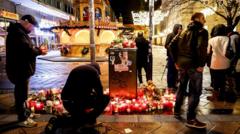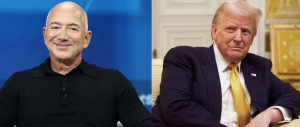As political turmoil destabilizes Germany and France, Europe faces a leadership vacuum at a critical moment with Donald Trump's election, promoting uncertainty in the ongoing Ukraine conflict.**
Leadership Challenges in Europe Amidst Political Instability**

Leadership Challenges in Europe Amidst Political Instability**
Germany and France's political crises coincide with the imminent Trump administration, raising concerns over European leadership.**
In recent weeks, Europe has found itself grappling with significant political upheaval, especially with the collapse of Chancellor Olaf Scholz’s government in Germany and President Emmanuel Macron's weakened position in France. This tumultuous backdrop coincides with the election of Donald J. Trump in the United States, leading to concerns about Europe's ability to effectively respond to global challenges, particularly regarding the ongoing conflict in Ukraine.
During a recent gathering in Brussels with Ukrainian President Volodymyr Zelensky, the baggage of Trump's presidency loomed large. Trump's return is expected to test the resilience of European unity and its steadfast support for Ukraine, particularly as many nations are preoccupied with their internal crises. Wolfgang Ischinger, former German ambassador to the U.S., expressed concern over the state of German politics, suggesting that the government’s instability arrives at a particularly inopportune time. He emphasized a need for competent leadership as the Trump narrative grows louder and more assertive.
While potential political shifts in Germany could pave the way for a more conservative leadership under Friedrich Merz, questions remain about how effective such a government might be in engaging with the next U.S. administration. Meanwhile, Macron remains intent on taking an active role in European affairs, even as he faces domestic challenges. His proposal for a potential European peacekeeping force in Ukraine, while ambitious, met with mixed reactions from fellow European leaders.
Amidst this backdrop of uncertainty, analysts are alert to the implications of weakened leadership as Europe stands at a crucial junction, underscoring the need for unity and strong responses to external threats. The future of European diplomacy, particularly regarding the Ukrainian conflict, depends on the region’s ability to stabilize politically and strategically in the face of new U.S. leadership under Trump.
During a recent gathering in Brussels with Ukrainian President Volodymyr Zelensky, the baggage of Trump's presidency loomed large. Trump's return is expected to test the resilience of European unity and its steadfast support for Ukraine, particularly as many nations are preoccupied with their internal crises. Wolfgang Ischinger, former German ambassador to the U.S., expressed concern over the state of German politics, suggesting that the government’s instability arrives at a particularly inopportune time. He emphasized a need for competent leadership as the Trump narrative grows louder and more assertive.
While potential political shifts in Germany could pave the way for a more conservative leadership under Friedrich Merz, questions remain about how effective such a government might be in engaging with the next U.S. administration. Meanwhile, Macron remains intent on taking an active role in European affairs, even as he faces domestic challenges. His proposal for a potential European peacekeeping force in Ukraine, while ambitious, met with mixed reactions from fellow European leaders.
Amidst this backdrop of uncertainty, analysts are alert to the implications of weakened leadership as Europe stands at a crucial junction, underscoring the need for unity and strong responses to external threats. The future of European diplomacy, particularly regarding the Ukrainian conflict, depends on the region’s ability to stabilize politically and strategically in the face of new U.S. leadership under Trump.






















